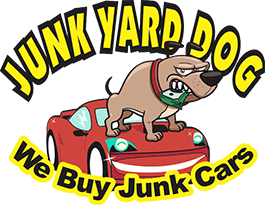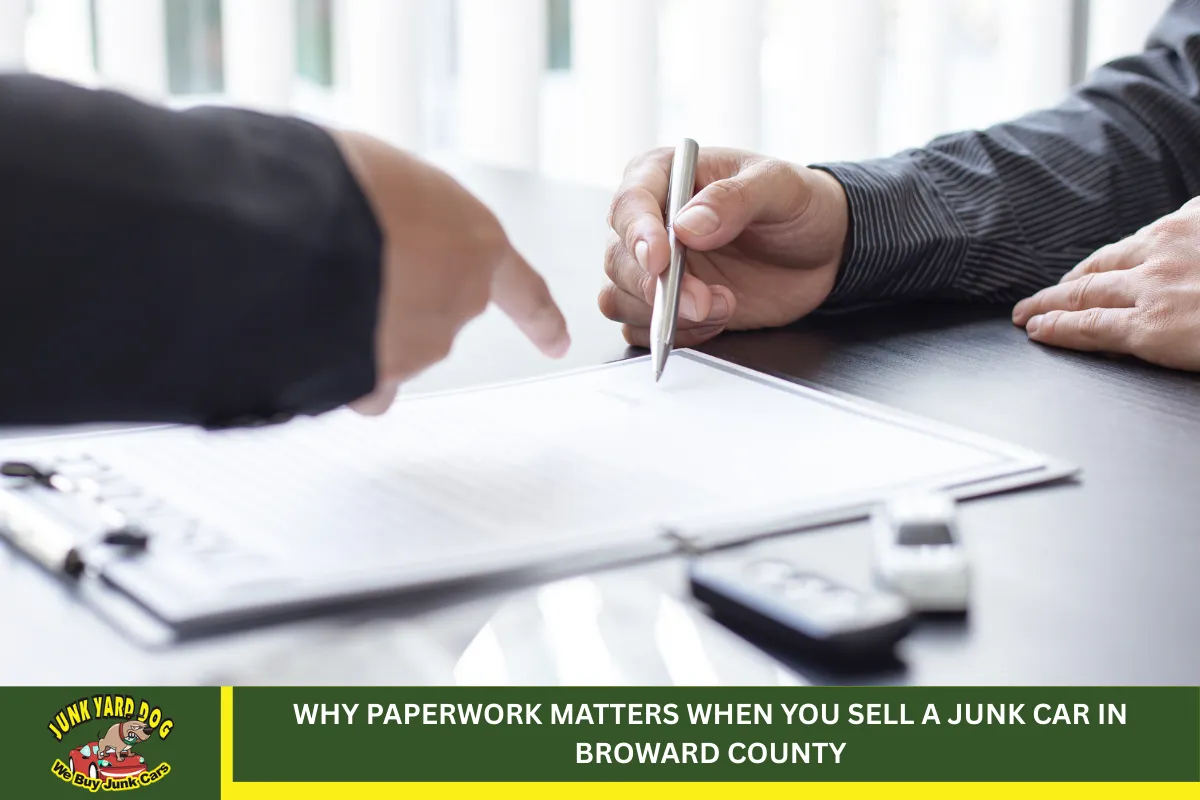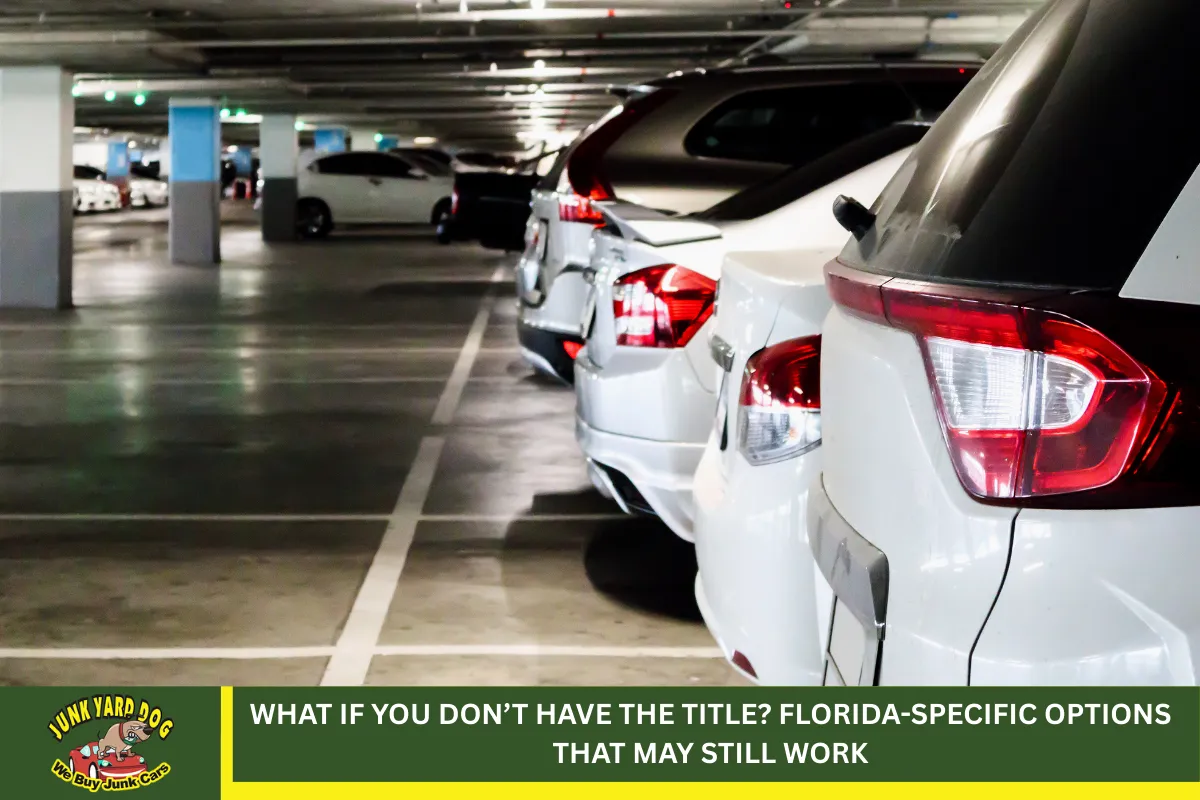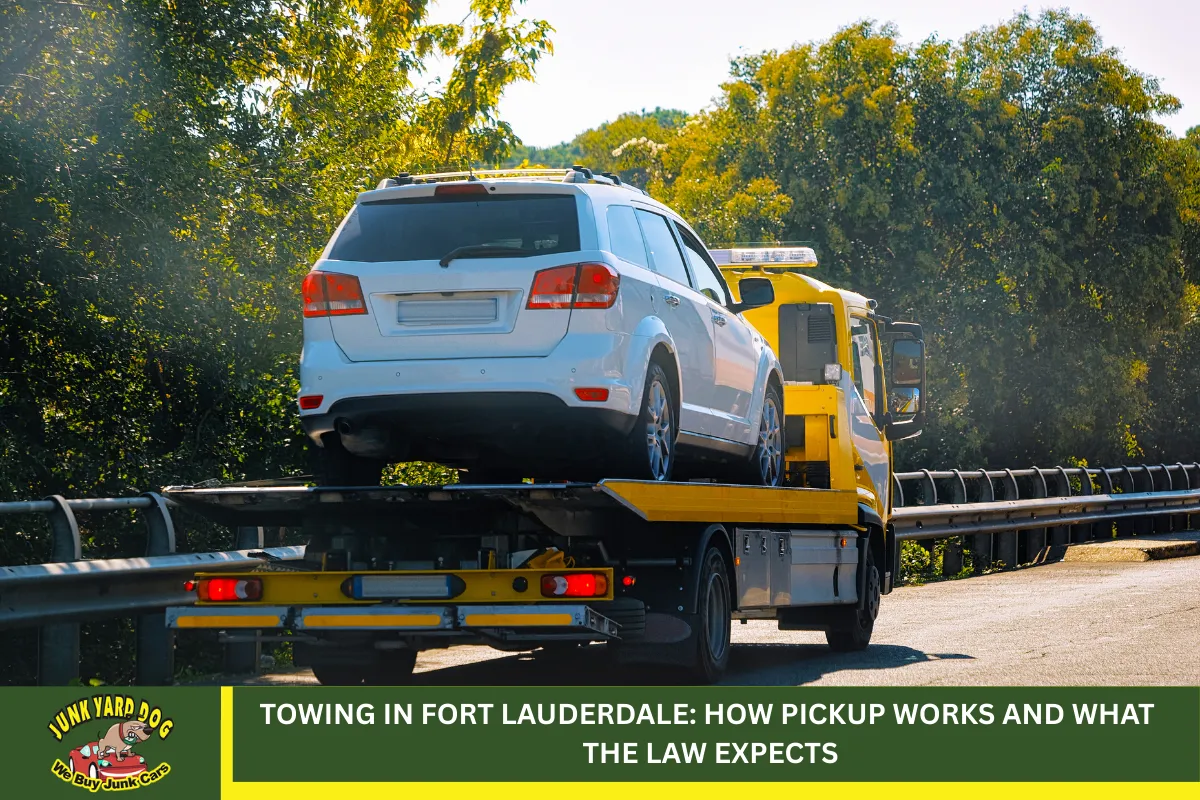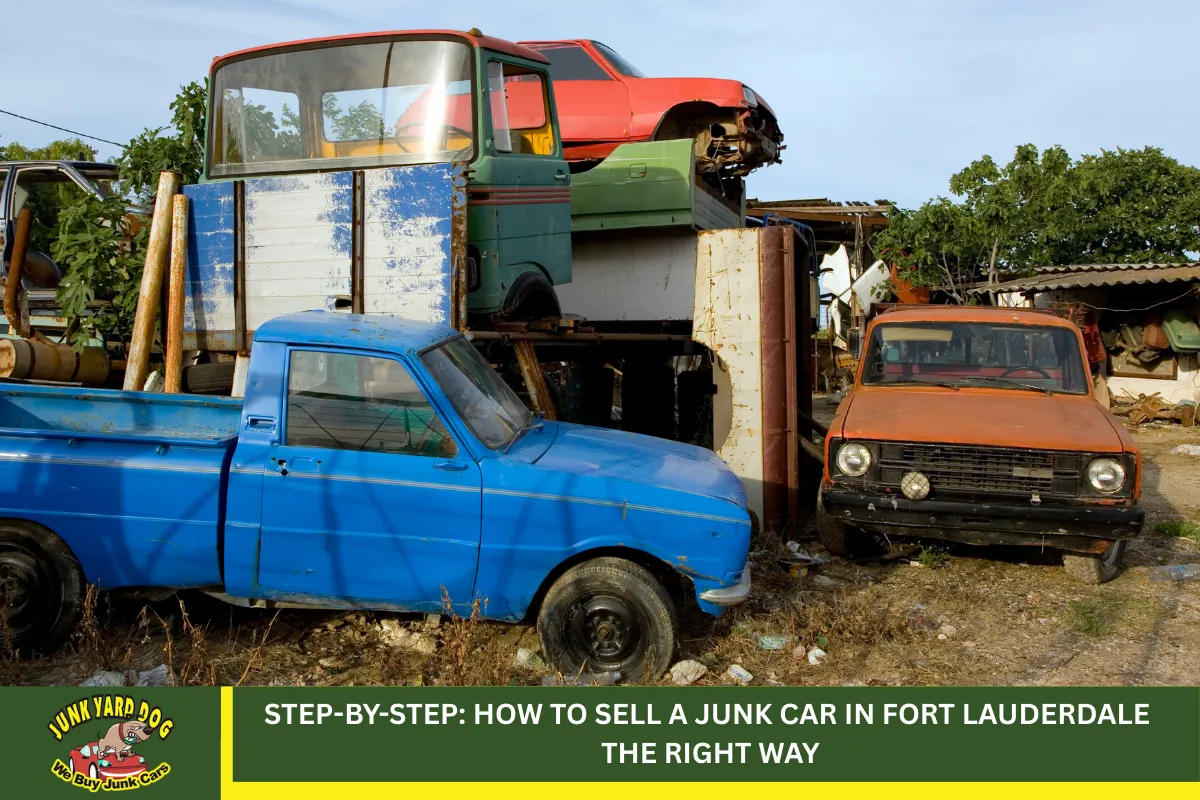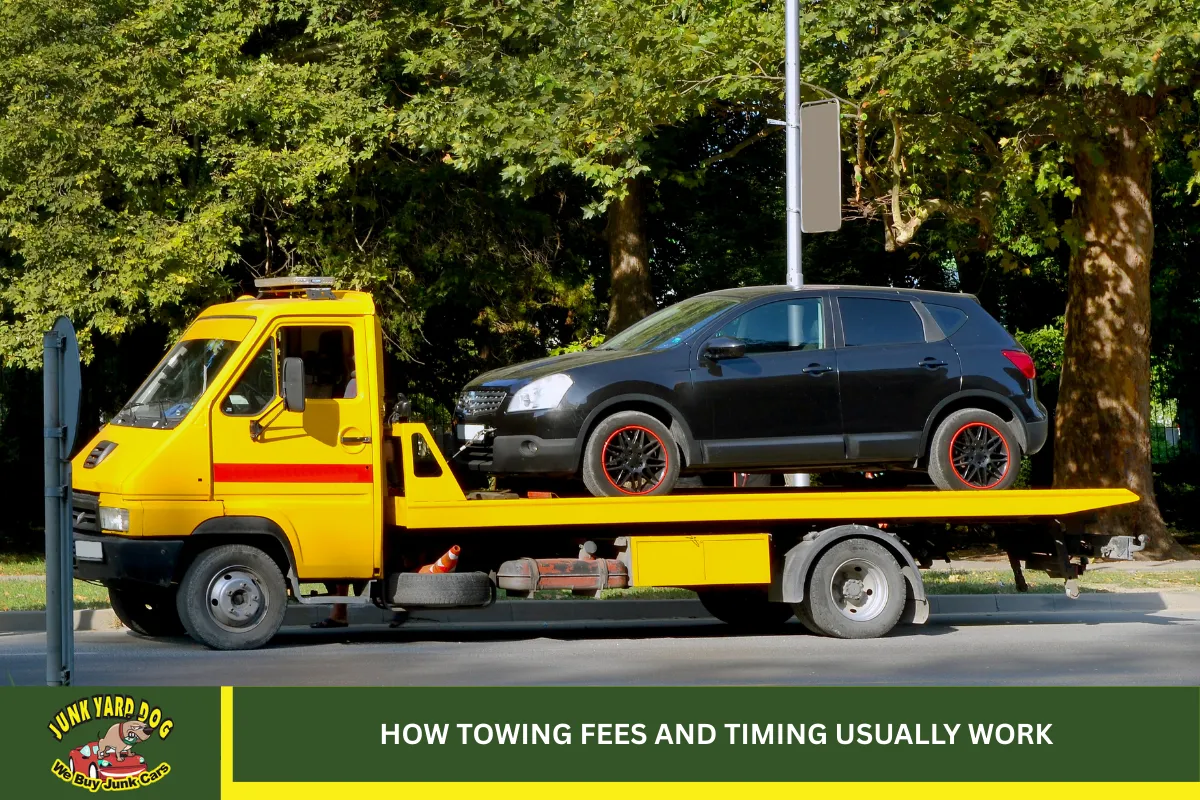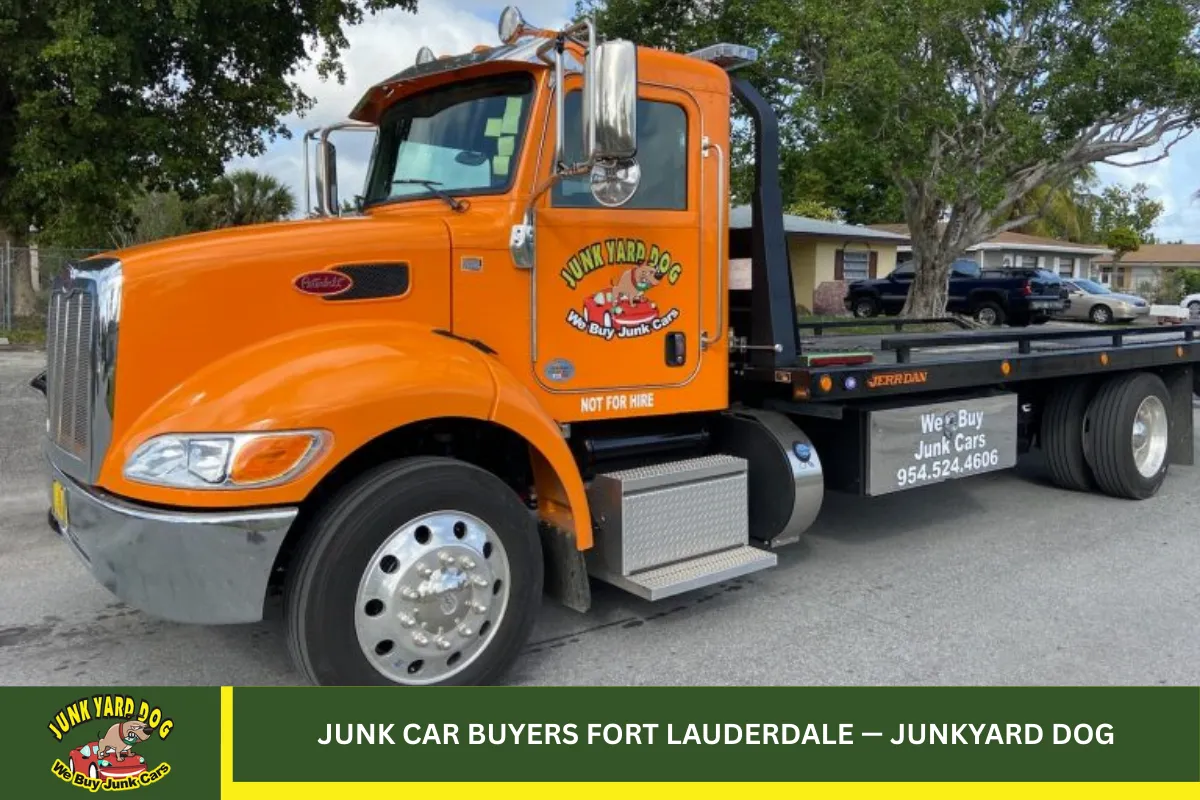Junk car buyers in Fort Lauderdale make it fast to turn an unwanted vehicle into money, but you’ll get the smoothest experience—and the best offer—when you have the right paperwork ready at pickup.
Why paperwork matters when you sell a junk car in Broward County
When you sell a vehicle for scrap or parts in Florida, you’re still transferring ownership. That means a buyer has to prove you’re the legal owner (or have lawful authority to sell) and that the vehicle can be dismantled or recycled. The documents you bring do two big things:
- Protect you from future liability if the car is towed, stored, or used after pickup.
- Help the buyer tow and process the vehicle legally, which often improves your offer.
This guide explains exactly what Fort Lauderdale junk car buyers typically require, your options if you don’t have a title, how towing works, and the quick steps to wrap it up legally.
The core documents most Fort Lauderdale junk car buyers ask for
Florida certificate of title (standard or salvage)
The certificate of title is the primary proof you own the vehicle. If the car still has a regular (blue) Florida title—or a branded salvage title after an insurance total loss—you’ll sign it over to the junk car buyer. Make sure the VIN on the title matches the vehicle, and fill out the seller portion clearly. If there’s a lien listed, you’ll need a lien release from the lender before the buyer can complete the transfer.
If you’ve lost the title, you typically have two choices:
- Apply for a duplicate/replacement with the state and then sell.
- Use a lawful alternative path for very old, low-value vehicles (see the “No title” section below). Florida recognizes lost or destroyed title scenarios and provides a process for replacement under its motor vehicle title rules.
A valid photo ID that matches the owner name
Buyers will want to see a government-issued photo ID (driver license or state ID). The name should match the owner(s) listed on the title or any alternative form used for transfer. If there are two owners connected by “and,” both must sign; if connected by “or,” either owner can sign.
A lien release (if applicable)
If a finance company is listed on the title, bring a lien satisfaction or release letter. Without it, most buyers can’t finalize payment, even if the car is old or inoperable.
Registration (helpful, but not always required)
An up-to-date registration can help verify details if the title is misplaced. Some buyers appreciate it, but it usually isn’t a substitute for a title unless you’re going through one of Florida’s derelict pathways described below.
What if you don’t have the title? Florida-specific options that may still work
Life happens: titles get lost, flooded, or tossed during moves. In Florida, you generally have three viable paths if your title is missing.
Option 1: Get a duplicate/replacement title
If the car is titled in Florida and you’re the owner, you can apply for a replacement through the state so you can sign the vehicle over to the buyer. This is the cleanest path and keeps offers strong because buyers can process the car quickly once they receive a properly reassigned title. Florida statutes contemplate replacement when certificates are lost or destroyed, and buyers often recommend this path if the car has residual value beyond scrap.
Option 2: Use a Derelict Motor Vehicle Certificate (for older, very low-value vehicles)
Florida allows licensed salvage motor vehicle dealers and registered secondary metals recyclers to acquire certain older, low-value vehicles without a title if specific criteria are met. This is done via the Derelict Motor Vehicle Certificate, which includes a request to cancel the title. In short:
- The vehicle must typically be at least ten model years old and valued below a modest threshold.
- The buyer (a licensed salvage dealer or secondary metals recycler) will use the derelict application with the seller’s identification to process the vehicle.
- This pathway is designed for vehicles headed for dismantling and recycling—not for resale on the road.
The Florida form and its procedural guidance explain the age/value limits and the requirement that a legible copy of the owner’s valid ID accompanies the application. Buyers familiar with this process will guide you if your vehicle qualifies.
Option 3: If the vehicle has a salvage title or certificate of destruction
Some cars already carry a salvage brand (after a total loss) or a certificate of destruction (COD). Junk car buyers that are licensed for salvage can purchase these vehicles, but they must process them under Florida’s salvage rules and may not be able to put them back on the road. If your paperwork says “salvage” or “certificate of destruction,” tell the buyer in advance; it won’t kill the deal, but it changes the processing path and sometimes the offer amount.
Beyond the title: documents and steps that protect you after pickup
File your Florida Notice of Sale promptly
Florida requires sellers to file a Notice of Sale shortly after transferring a vehicle. You can complete the Notice of Sale on the back of the title or use the state’s standalone form (often used as a bill of sale as well). Filing the Notice of Sale helps remove your name from future liability—tickets, towing, or other uses after the car leaves your driveway. Counties emphasize a 30-day timeframe to submit this notice.
Use a simple bill of sale if needed
Although the title itself transfers ownership, a bill of sale records the date, sale price (or “scrap”), buyer/seller info, and VIN. This document can be combined with the Notice of Sale on the state form and is useful if questions come up later.
Remove your license plates before the tow truck leaves
In Florida, the plate stays with you—not the car. Remove it at pickup and either transfer it to another vehicle or surrender it if you’re cancelling insurance or moving out of state. This is a small step that prevents headaches later.
Towing in Fort Lauderdale: how pickup works and what the law expects
Most reputable junk car buyers include free towing in their offers and coordinate pickup windows that fit your schedule. Here’s what matters in Broward County and nearby areas:
- Where the car will be stored after towing: Florida statutes set distance and access standards for towed vehicles, primarily to protect owners from predatory practices. While these rules are often discussed in the context of private-property tows, they also set general expectations for storage distance and retrieval hours. Fort Lauderdale sits within a high-population county, which affects certain towing radius rules.
- Access for the tow truck: Tell the buyer if the car is blocked in, missing wheels, or located in a parking garage. Special equipment may be needed, and clarifying this upfront prevents rescheduling and fees.
- Private property permissions: If the car sits at an apartment, HOA, or workplace lot, make sure you have authority to release it; some properties require written permission or specific tow procedures.
What reputable junk car buyers in Fort Lauderdale typically provide
Free towing and same-day or next-day pickup
Legitimate buyers serving Fort Lauderdale, Hollywood, Pompano Beach, and Dania Beach commonly include local towing at no added charge and can often schedule same-day or next-day pickups for straightforward cases. If a vehicle requires special equipment or is outside the normal service area, there may be modest adjustments to the offer.
On-the-spot payment
It’s common to be paid at pickup—often by cash or company check—once paperwork is verified and the driver confirms the vehicle’s condition matches what you described. Ask how they pay before you accept the offer, and never hand over signed paperwork without a clear plan to be paid immediately.
Help with paperwork
The better buyers walk you through where to sign, how to remove plates, and how to file the Notice of Sale. If you’re missing a document, they’ll suggest lawful alternatives or help you navigate replacement.
Step-by-step: how to sell a junk car in Fort Lauderdale the right way
- Gather vehicle details
Find the VIN, mileage (estimate if the cluster is dead), trim level, major issues, and whether the catalytic converter is intact.
- Call or submit for quotes
Share the basics with 2–3 local buyers to compare offers. Be honest about missing parts (wheels, battery, catalytic converter) so the quote matches reality.
- Confirm the documents you’ll use
- Best: sign the Florida title to the buyer.
- Alternative (if eligible): the derelict certificate path through a licensed salvage buyer.
- Replacement: apply for a duplicate title if yours is lost and the car has value beyond scrap
- Schedule towing and prepare the car
Remove personal items from the cabin and trunk. Clear the path to the vehicle so the truck can access it quickly.
- Remove your plates
Unscrew the license plates and keep them. Transfer or surrender them per your situation.
- Meet the driver and finalize
Present your ID, sign the title (or applicable paperwork), receive payment, and take a photo of the completed document for your records.
- File your Notice of Sale
Complete and submit the Notice of Sale promptly so you’re no longer on the hook for anything that happens with that VIN after pickup.
- Handle insurance
After the transfer is complete, call your insurer to cancel or adjust coverage. If you’re surrendering the plate, do so to avoid insurance and registration complications.
What affects your “cash for junk cars” offer in Fort Lauderdale
Weight and current scrap metal markets
Scrap prices fluctuate week to week. Heavier vehicles typically bring more because the buyer’s core revenue is the recyclable metal content. Trucks, SUVs, and vans often outpace small sedans.
Catalytic converter status
Modern catalytic converters contain precious metals. If yours is intact and original, the buyer’s offer may be higher; if it’s been removed, expect the opposite.
Title status
A clean, signed title usually yields a stronger offer because it reduces processing friction and cost. If the buyer must use a derelict pathway or handle a salvage/COD scenario, the offer may be adjusted to account for that administration.
Completeness and condition
Cars that roll, steer, and have wheels are easier to load, which can improve offers or at least keep them from being reduced at pickup.
Fort Lauderdale seller checklist: documents and info to have on the kitchen counter
- Florida title (or salvage title) signed where required
- Government-issued photo ID that matches the title name
- Lien release (if a lienholder is printed on the title)
- Keys (helpful, not always required)
- Plates removed and set aside
- Simple bill of sale (if you want a separate record)
- Notice of Sale filled out and ready to file after pickup
Special cases: when your junk car lives in an apartment lot, alley, or storage space
- Apartment or HOA parking: Ask management if any permission form is required before a tow truck enters. Some communities have towing rules, gate codes, or loading restrictions.
- Tight spaces: Tell the buyer if the vehicle is in a garage, behind another car, or missing wheels; they’ll send the right truck (e.g., a rollback with skates).
- Private property towing expectations: Florida has well-defined limits for where a towed vehicle can be stored and access to retrieve it. While junk car pickups are consensual, knowing these consumer-protection norms can help you spot predatory behavior.
How towing fees and timing usually work
Free local towing
Most Fort Lauderdale junk car buyers price towing into their offers for addresses in Broward County and close-in areas of Palm Beach and Miami-Dade. If your vehicle sits far from main corridors or needs specialized equipment, clarify whether there’s any deduction.
Same-day pickups
When you have the title and ID ready, many buyers can schedule same-day or next-day pickup. If you need to meet at work or during a lunch hour, mention that—some will accommodate quick windows.
Driver checks at pickup
Expect the driver to confirm the VIN, assess whether the vehicle matches the described condition, and verify signatures and ID. This is standard and protects both parties.
Avoid these common headaches when selling to junk car buyers
- Signing the wrong place on the title: If you’re unsure, ask the buyer’s dispatcher or the driver to point to the exact fields. Incorrect signatures can delay payment.
- Letting your plates leave with the car: In Florida, plates stay with you—take them off before the truck rolls
- Forgetting the Notice of Sale: Submitting your Notice of Sale promptly helps cut off liability for tickets or tows generated after the sale.
- Accepting vague promises of later payment: Don’t hand over a signed title without immediate payment or a clearly documented payment method.
- Not disclosing missing parts: If the catalytic converter, battery, wheels, or airbags are gone, say so before pickup. Surprises can reduce your offer on the spot.
A quick “cash for junk cars” script you can use on the phone
When you call or text for quotes, share:
- Year, make, model, and trim (e.g., 2012 Honda Accord EX)
- Whether it starts, drives, or has a dead battery
- Major damage (flood, fire, severe collision)
- What’s missing (catalytic converter, wheels, airbags)
- Whether you have a Florida title in your name, a salvage title, or no title
- Exact location (e.g., Victoria Park, Flagler Village, Lauderdale Manors) and any access notes (gated, garage, apartment lot)
This short list gives buyers enough to make a firm offer and schedule towing.
When it’s more than scrap: insurance totals and post-accident decisions
If your car was recently totaled, you may be holding an insurance payout and a salvage title. In that case, compare the junk offer against the insurer’s salvage retention value and storage fees. Salvage titles can be sold to junk car buyers, but rules limit returning those vehicles to the road; most will be dismantled or sold for parts, not re-registered for street use.
Keep it simple: your Fort Lauderdale junk car sale in 10 minutes
- Bring your Florida title (or discuss the no-title derelict path for old, low-value vehicles).
- Have your ID ready.
- Clear the car, remove your plates, and stage it for easy tow access.
- Get paid at pickup.
- File your Notice of Sale right after the truck leaves.
That’s it. With the right paperwork, junk car buyers in Fort Lauderdale can turn a driveway headache into cash the same day, while you stay fully protected under Florida’s title and towing rules.
Driveway back, cash in hand—here’s your final checklist
- Title signed correctly, lien released if needed
- Photo ID matches the owner name on the paperwork
- Plates removed (they stay with you in Florida)
- Personal items cleaned out
- Payment method confirmed before signing
- Notice of Sale submitted within the stated timeframe
Follow these steps and you’ll have a quick, compliant sale—no surprises, no callbacks, and no extra fees—just a clean transfer and a fair “cash for junk cars” payout from a reputable Fort Lauderdale buyer.
Junk Car Buyers Fort Lauderdale — Junkyard Dog
Ready to clear space and get paid today? Junkyard Dog is Fort Lauderdale’s trusted team of junk car buyers delivering fast quotes, free towing, and on-the-spot payment. We follow Florida’s paperwork rules—title, ID, and lien release if needed—so your sale is simple and secure. Whether your vehicle is wrecked, non-running, or missing parts, our cash for junk cars offers are fair, transparent, and scheduled on your time.
Call (954) 524-4606 or fill out our quick contact form for a guaranteed pickup window. Serving Fort Lauderdale, Hollywood, Pompano Beach, and nearby neighborhoods, we make it easy to remove your old car the right way—no surprises, no fees, just courteous service and cash in hand. Get your best local cash offer today.
Frequently asked questions about cash for junk cars in Fort Lauderdale
Do junk car buyers require a title?
Usually yes. A properly signed Florida title is the cleanest way to transfer ownership and generally gets the best offer. If you don’t have a title and the vehicle is old and very low in value, a licensed salvage buyer may process it with Florida’s derelict certificate pathway, which requires your ID and other specifics. Ask the buyer whether your vehicle qualifies.
Can I sell a junk car with a salvage title?
Yes. Licensed buyers routinely purchase salvage-title vehicles, but they must process them under salvage rules, which can affect price and future road use.
What ID does the driver need to see?
A valid government-issued photo ID that matches the name on the title or lawful transfer paperwork.
Do I need to remove my license plate?
Yes—Florida plates stay with the seller. Remove the plate before the vehicle is towed, and transfer or surrender it as appropriate.
Is towing really free?
For most in-county addresses and straightforward pickups, yes. If your vehicle is unusually hard to access or located far outside the service area, discuss any adjustments in advance.
How long do I have to file the Notice of Sale?
Counties emphasize filing within 30 days after the sale. Doing so quickly helps protect you from liability.
Read Junk Car Buyers in Fort Lauderdale, FL: Cash Offers by Make, Model, and Condition
